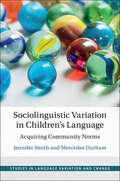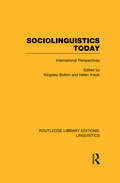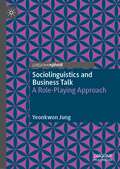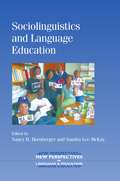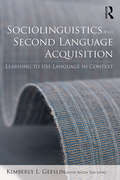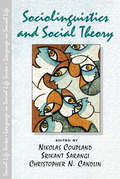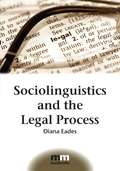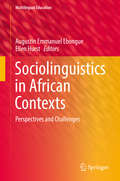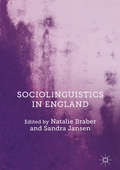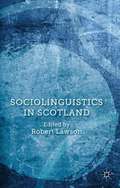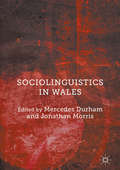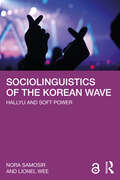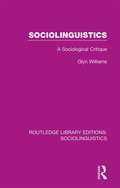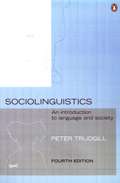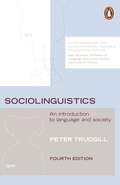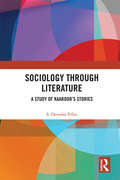- Table View
- List View
Sociolinguistic Variation in Children's Language: Acquiring Community Norms (Studies in Language Variation and Change)
by Jennifer Smith Mercedes DurhamHow we vary our speech is fundamental in signalling who we are, where we're from and where we're going. How and when does such variation arise? Here, leading experts Jennifer Smith and Mercedes Durham address this question through a sociolinguistic analysis of the speech of preschool children in interaction with their primary caregivers. Bringing together two fields of linguistic research - variationist sociolinguistics and first language acquisition - the study focusses both qualitative and quantitative analysis of a range of variables to show when and how variation is acquired by young children, and the effect the caregiver's interaction has on this process. In doing so, they tackle a fundamental question in language research: when and how do children acquire the highly complex patterns of variation widely attested in adult speech?
Sociolinguistics
by Florian CoulmasIn 28 newly-commissioned chapters, distinguished contributors provide an up-to-date overview of sociolinguistics. This invaluable work of reference, now available in paperback, identifies the most important issues of sociolinguistics, makes primary sources more accessible, and provides orientation for future research. Reflecting the main division within the discipline, the two key sections deal with the social dimensions of language and the linguistic dimensions of society. In addition, there is an introductory section taking issue with the theoretical and methodological foundations of sociolinguistic knowledge which have proved to be especially fruitful in recent years: education, bilingual education, the legal profession and language planning. The Handbook is equipped with a comprehensive bibliography which can be used as a research tool in its own right.
Sociolinguistics
by Nikolas CouplandIn the first volume of this kind for years, the editors have assembled a definitive view of the discipline bringing together much original work in sociolinguistics, ranging from fundamental theoretical statements and methodological articles, to classic explorations in dialect and style variation, language attitudes and stereotyping, multilingualism, face-to-face interaction and ethnography of communication. The contributors are eminent sociolinguists acclaimed internationally as pioneers and leading authorities in the field. This major new textbook will be a unique and invaluable resource for students and teachers of sociolinguistics and neighbouring disciplines.
Sociolinguistics Today: International Perspectives (Routledge Library Editions: Linguistics)
by Kingsley Bolton Helen KwokThis collection of essays developed out of a conference held in Hong Kong in 1988. The aim was to provide a forum for an exchange of views between academics working within the field of sociolinguistics, in particular between those working in the West and those working in the East. Sociolinguistics Today has taken this aim a step further to produce an overview of contemporary research into sociolinguistics worldwide. The book contains articles by acknowledged leaders in the study of language and society, and the presence of sociolinguists working in Asia provides a new and exciting challenge to the hitherto western-dominated field. The comprehensive study of Asian sociolinguistics is unique and engages with the non-Asian contributions to great effect. The range of contributors reinforces the international emphasis of the book.
Sociolinguistics and Business Talk: A Role-Playing Approach
by Yeonkwon JungThis book delivers essential skills in “spoken” professional communications, presenting theoretical and applied frameworks for business talk using English as a lingua franca. Adopting a role-playing approach mimicking various professional settings, it assesses the strength of the well-reasoned argument, the logical links that convince the audience of the coherence of the speaker’s argument and the necessary linguistics competencies. This book centers on a variety of situations that commonly take place in business organizations (such as relational talk; call center talk; job application talk) and addresses key skills such as conflict resolution and collaborative problem solving through communication, which are key for both students and practitioners. In addition it analyses spoken business discourse data with the four main sources of communicative competence: grammatical competence, discourse competence, sociolinguistic competence and strategic competence in order to highlight how they are used in business speaking practices.
Sociolinguistics and Deaf Communities
by Ceil Lucas Adam C. SchembriHow do people use sign languages in different situations around the world? How are sign languages distributed globally? What happens when they come in contact with spoken and written languages? These and other questions are explored in this new introduction to the sociolinguistics of sign languages and deaf communities. An international team brings insights and data from a wide range of sign languages, from the USA, Canada, England, Spain, Brazil and Australia. Topics covered include multilingualism in the global deaf community, sociolinguistic variation and change in sign languages, bilingualism and language contact between signed and spoken languages, attitudes towards sign languages, sign language planning and policy, and sign language discourse. Sociolinguistics and Deaf Communities will be welcomed by students of sign language and interpreting, teachers of sign language, and students and academics working in linguistics.
Sociolinguistics and Language Education
by Sandra Lee Mckay Nancy H. HornbergerThis book, addressed to experienced and novice language educators, provides an up-to-date overview of sociolinguistics, reflecting changes in the global situation and the continuing evolution of the field and its relevance to language education around the world. Topics covered include nationalism and popular culture, style and identity, creole languages, critical language awareness, gender and ethnicity, multimodal literacies, classroom discourse, and ideologies and power. Whether considering the role of English as an international language or innovative initiatives in Indigenous language revitalization, in every context of the world sociolinguistic perspectives highlight the fluid and flexible use of language in communities and classrooms, and the importance of teacher practices that open up spaces of awareness and acceptance of --and access to--the widest possible communicative repertoire for students.
Sociolinguistics and Second Language Acquisition: Learning to Use Language in Context (Second Language Acquisition Research Series)
by Kimberly L. Geeslin Avizia Yim LongSociolinguistics and Second Language Acquisition is a comprehensive textbook that bridges the gap between the fields of sociolinguistics and second language acquisition, exploring the variety of ways in which social context influences the acquisition of a second language. It reviews basic principles of sociolinguistics, provides a unified account of the multiple theoretical approaches to social factors in second languages, summarizes the growing body of empirical research, including examples of findings from a wide range of second languages, and discusses the application of sociolinguistics to the second language classroom. Written for an audience that extends beyond specialists in the field, complete with summary tables, additional readings, discussion questions, and application activities throughout, this volume will serve as the ideal textbook for advanced undergraduate or graduate students of second language acquisition and instruction, and will also be of interest to researchers in the fields of second language acquisition, second language instruction and sociolinguistics.
Sociolinguistics and Social Theory (Language In Social Life)
by Nikolas Coupland Srikant Sarangi Christopher N. CandlinThe empirical and descriptive strengths of sociolinguistics, developed over more than 40 years of research, have not been matched by an active engagement with theory. Yet, over this time, social theorising has taken important new turns, linked in many ways to linguistic and discursive concerns. Sociolinguistics and Social Theory is the first book to explore the interface between sociolinguistic analysis and modern social theory. The book sets out to reunite sociolinguistics with the concepts and perspectives of several of the most influential modern theorists of society and social action, including Bakhtin, Foucault, Habermas, Sacks, Goffman, Bourdieu and Giddens. In eleven newly commissioned chapters, leading sociolinguists reappraise the theoretical framing of their research, reaching out beyond conventional limits. The authors propose significant new orientations to key sociolinguistic themes, including- - social motivations for language variation and change- language, power and authority- language and ageing- language, race and class- language planningIn substantial introductory and concluding chapters, the editors and invited discussants reassess the boundaries of sociolinguistic theory and the priorities of sociolinguistic methods. Sociolinguistics and Social Theory encourages students and researchers of sociolinguistics to be more reflexively aware and critical of the social bases of their analyses and invites a reasessment of the place sociolinguistics occupies in the social sciences generally.
Sociolinguistics and the Legal Process
by Diana EadesSociolinguistics and the Legal Process is an introduction to language, law and society for advanced undergraduate and postgraduate students. Its central focus is the exploration of what sociolinguistic research can tell us about how language works and doesn't work in the legal process. Written for readers who may not have prior knowledge of sociolinguistics or the law, the book has an accessible style combined with discussion questions and exercises as well as topics for assignments, term papers, theses and dissertations. A wide range of legal contexts are investigated, including courtroom hearings, police interviews, lawyer interviews as well as small claims courts, mediation, youth justice conferencing and indigenous courts. The final chapter looks at how sociolinguists can contribute to the legal process: as expert witnesses, through legal education, and through investigating the role of language in the perpetuation of inequality in and through the legal process.
Sociolinguistics from the Periphery
by Helen Nikolas Coupland Sari Pietikäinen Kelly-Holmes Alexandra JaffeThis leading team of scholars presents a fascinating book about change: shifting political, economic and cultural conditions; ephemeral, sometimes even seasonal, multilingualism; and altered imaginaries for minority and indigenous languages and their users. The authors refer to this network of interlinked changes as the new conditions surrounding small languages (Sámi, Corsican, Irish and Welsh) in peripheral sites. Starting from the conviction that peripheral sites can and should inform the sociolinguistics of globalisation, the book explores how new modes of reflexivity, more transactional frames for authenticity, commodification of peripheral resources, and boundary-transgression with humour, all carry forward change. These types of change articulate a blurring of binary oppositions between centre and periphery, old and new, and standard and non-standard. Such research is particularly urgent in multilingual small language contexts, where different conceptualisations of language(s), boundaries, and speakers impact on individuals' social, cultural, and economic capital, and opportunities.
Sociolinguistics in African Contexts
by Augustin Emmanuel Ebongue Ellen HurstThis volume offers a new perspective on sociolinguistics in Africa. Eschewing the traditional approach which looks at the interaction between European and African languages in the wake of colonialism, this book turns its focus to the social dynamics of African languages and African societies. Divided into two sections, the book offers insight into the crucial topics such as: language vitality and endangerment, the birth of 'new languages', a sociolinguistics of the city, language contact and language politics. It spans the continent from Algeria to South Africa, Guinea-Bissau to Kenya and addresses the following broad themes: Language variation, contact and change The dynamics of urban, rural and youth languages Policy and practice This book provides an alternative to the Eurocentric view of sociolinguistic dynamics in Africa, and will make an ideal read or supplemental textbook for scholars and students in the field/disciplines of African languages and linguistics, and those interested in southern theory or 'sociolinguistics in the margins'.
Sociolinguistics in England
by Natalie Braber Sandra JansenThis book presents an overview of sociolinguistic research in England. Showcasing developments in sociolinguistic theory, method and application, the chapters examine sociolinguistic topics on different linguistic levels and in different geographical areas across the country. Allowing the reader to engage with contemporary research in the field, each chapter is unique in the topic or geographical area explored. Topics include historical sociolinguistics, British Sign Language, lexical variation, life-span change, and variation and innovation in urban and peripheral areas; while the regions covered range from Cornwall to West Cumbria. Edited and authored by a range of international scholars, this is sure to be a key research resource for students and scholars interested in language use in England.
Sociolinguistics in Scotland
by Robert LawsonSociolinguistics in Scotland presents a comprehensive overview of sociolinguistic research in Scotland and showcases developments in sociolinguistic theory, method and application, highlighting Scotland's position as a valuable 'sociolinguistic laboratory'. This book is a key resource for those interested in language use in Scotland.
Sociolinguistics in Wales
by Jonathan Morris Mercedes DurhamThis volume showcases recent sociolinguistic research about Wales and offers contributions from scholars working on Welsh, English and other languages spoken in the country. The chapters present a range of frameworks and methodologies used in sociolinguistics and apply them to the Welsh linguistic context. This context is very distinctive compared to the rest of the UK and represents a prime ground to observe different aspects of the interplay between language and society. The structure of the volume reflects the linguistic diversity of the country and is divided into three sections. The first section examines recent research on Welsh, the second section focuses on English, and the third section deals with research on Welsh and English together, as well as research on other languages spoken in Wales. The book will be useful to those wanting to discover more about language and society in Wales, as well as to those already working in the field as it offers new perspectives and insights.
Sociolinguistics of the Korean Wave: Hallyu and Soft Power
by Lionel Wee Nora SamosirSamosir and Wee examine how the immensely popular Korean Wave ("K-wave") also known as Hallyu is wielded as soft power through the use of communication for persuasion and attraction on the global stage. The Korean Wave refers to the global spread and popularity of South Korean culture, particularly its pop music ("K-pop"), serialised dramas ("K-dramas") and films ("K-films"). Given the South Korean government’s involvement in providing funding and publicity, the Korean Wave raises interesting sociolinguistic questions about the relationship between artistry and citizenship, the use of social media in facilitating the consumption of cultural products, and, ultimately, the nature of soft power itself. Studies of soft power have tended to come from the field of international relations. This book shows that sociolinguistics actually has a number of tools in its conceptual arsenal – such as indexicality, stance taking, affect, and styling – that can shed light on the Korean Wave as a form of soft power. As the first book-length sociolinguistic analysis of the Korean Wave and soft power, this book demonstrates how K-pop, K-dramas, and K-films have been able to encourage in consumers an anthropological stance towards all things Korean. This volume will be of particular interest to students and scholars in sociolinguistics, political science, cultural studies, and Korean studies.
Sociolinguistics: A Sociological Critique (Routledge Library Editions: Sociolinguistics)
by Glyn WilliamsOriginally published in 1992. This provocative and controversial book calls for a critical analysis of the philosophical assumptions underpinning sociolinguistics. Going back to the philosophical roots of the study of language in society, it argues that they lie in the consensual attitude to society derived from eighteenth and nineteenth-century social thought. The leading figures in the field are challenged for their unequivocal acceptance of the sociological theory on which they draw. For researchers of language in society, this book emphasises the sociological rather than the linguistic side of the subject.
Sociolinguistics: An Introduction to Language and Society
by Peter TrudgillThis is a classic book on a fascinating subject. Peter Trudgill examines the close link between language and society and the many factors that influence the way we speak. These range from gender, environment, age, race, class, region and politics. Trudgill's book surveys languages and societies from all over the world drawing on examples from Afrikaans to Yiddish. He has added a fascinating chapter on the development of a language as a result of a non-native speaker's use of it. Compelling and authoritative, this new edition of a bestselling book is set to redraw the boundaries of the study of sociolinguistics.
Sociolinguistics: An Introduction to Language and Society
by Peter TrudgillThis is a classic book on a fascinating subject. Peter Trudgill examines the close link between language and society and the many factors that influence the way we speak. These range from gender, environment, age, race, class, region and politics. Trudgill's book surveys languages and societies from all over the world drawing on examples from Afrikaans to Yiddish. He has added a fascinating chapter on the development of a language as a result of a non-native speaker's use of it. Compelling and authoritative, this new edition of a bestselling book is set to redraw the boundaries of the study of sociolinguistics.
Sociology Through Literature: A Study of Kaaroor's Stories
by S. Devadas PillaiThis book presents a comprehensive study of nearly 100 of Kaaroor’s short stories. Kaaroor Neelakanta Pillai is one among the Big Six of the ‘new wave’ in Malayalam literature which began in the mid-1940s. The Big Six and their immediate followers wrote about the common man, peasants, pavement-dwellers, fishermen, rickshaw-pullers, underpaid school teachers — their lives, aspirations and vulnerabilities. By treating Kaaroor’s stories as case studies, the book takes a sociological approach to understanding the representation of a wide array of themes: romantic overtones, erotic pursuits, marital episodes, issues of family, lives of children, behavioural patterns, shades of greed, the idea of spirituality and politics in Malayalam literature. With its annotated transcreation and detailed commentary, this book brings Kaaroor’s works to the general reader, and will be useful to scholars and researchers of South Asian literature, English literature, linguistics, cultural studies, besides those interested in Malayalam literature and the Malayali/Indian diaspora across the world.
Sociología de Karol Wojtyla: La civilización del amor
by Juan Lasterra MarcoEl siglo XXI nace con la nueva utopía social de Karol Wojtyla: una sociedad personalista, la sociedad del amor. Ha muerto el optimismo por la utopía del comunismo que prometía el progreso de las fuerzas de la materia, hasta llegar al «paraíso comunista», un mundo feliz. Ha muerto también el liberalismo como utopía que prometía el progreso y la sociedad del bienestar, con la defensa de la «individualidad absoluta». Entramos en el siglo XXI en el que, muertas las grandes utopías, se está imponiendo en todas las naciones la «democracia vacía». En este nuevo milenio se nos presenta una nueva utopía, la de una sociedad personalista, la sociedad del amor. Una sociedad en la que lo primero, la base de toda iniciativa sea la persona humana, y su ámbito natural de desarrollo el matrimonio y la familia, y el trabajo; los dos «indicadores de calidad» para la evaluación del adecuado funcionamiento de toda sociedad, los dos pilares sobrelos que el hombre como persona humana, ser-en-relación, se realiza.
Sociopragmatics of Japanese: Theoretical Implications (Routledge Research in Pragmatics)
by Michael Haugh Yasuko ObanaObana and Haugh question the extent to which commonly accepted theories in pragmatics can readily explain sociopragmatic phenomena in Japanese. Studies of Japanese in pragmatics have often challenged the cross-linguistic relevance of dominant theories. However, they have also inadvertently perpetuated stereotypes about the Japanese. It is often been assumed, for instance, that Japanese people are less strategic, more polite and more reliant on tacit forms of communication than speakers of other languages. But the Japanese are not as polite as one might think. The aim of this book is thus to question those folk assumptions around politeness, impoliteness, irony and indirectness while at the same time emphasizing that close examination of sociopragmatic phenomena in Japanese yields important empirical insights that combat common theoretical assumptions in pragmatics. The content is structured in three parts, in which the authors highlight a key building block of a theory of sociopragmatics. Part I focuses on indexing through the lens of chapters on honorifics, routine formula and politeness strategies. Part II focuses on evaluating through the lens of chapters on giving/receiving expressions and honorific irony. Finally, Part III focuses on relating through the lens of chapters on joint utterances and off record requests. Throughout the chapters the authors draw attention to ways in which these three dimensions are invariably intertwined in various ways. This book is not simply a collection of studies that promotes our understanding of the sociopragmatics of a particular language, but goes deeper and challenges what many have taken for granted in pragmatics. It proposes a framework for exploring sociopragmatic phenomena, building on the key sociopragmatic axes of indexing, evaluating and relating, and offers fresh new perspectives on time-honoured phenomena in pragmatics. It will interest scholars and postgraduate students in pragmatics, particularly those specializing in: politeness, impoliteness, indirectness and irony. The book explains what Japanese terms mean, and all the Japanese examples are morphologically-glossed. Therefore, teachers (and advanced learners) of Japanese at all levels will benefit from the book as it will enrich their knowledge of the Japanese language.
Sock Monkeys Have Issues
by Colin HarrisonSock Monkeys have issues with moths. They also have trouble with pterodactyls, home improvement projects, kittens (who tend to unravel them), and paparazzi. They really like bananas, jet packs, sock puppies, and romance, but have MAJOR issues with clowns, embarrassing relatives (King Kong), and gym socks. Through it all, they really adore one thing. Author of the breakout hit Zombies Hate Stuff, Greg Stones turns his popular, playfully absurd illustration style and subversive humor to the lovable but issue-fraught world of sock monkeys, detailing their inner lives and misadventures with a playful wit that will appeal to cheeky monkeys of all ages.
Sock Monkeys Have Issues
by Colin HarrisonSock Monkeys have issues with moths. They also have trouble with pterodactyls, home improvement projects, kittens (who tend to unravel them), and paparazzi. They really like bananas, jet packs, sock puppies, and romance, but have MAJOR issues with clowns, embarrassing relatives (King Kong), and gym socks. Through it all, they really adore one thing. Author of the breakout hit Zombies Hate Stuff, Greg Stones turns his popular, playfully absurd illustration style and subversive humor to the lovable but issue-fraught world of sock monkeys, detailing their inner lives and misadventures with a playful wit that will appeal to cheeky monkeys of all ages.
Sock Monkeys Have Issues
by Greg StonesSock Monkeys have issues with moths. They also have trouble with pterodactyls, home improvement projects, kittens (who tend to unravel them), and paparazzi. They really like bananas, jet packs, sock puppies, and romance, but have MAJOR issues with clowns, embarrassing relatives (King Kong), and gym socks. Through it all, they really adore one thing. Author of the breakout hit Zombies Hate Stuff, Greg Stones turns his popular, playfully absurd illustration style and subversive humor to the lovable but issue-fraught world of sock monkeys, detailing their inner lives and misadventures with a playful wit that will appeal to cheeky monkeys of all ages.
